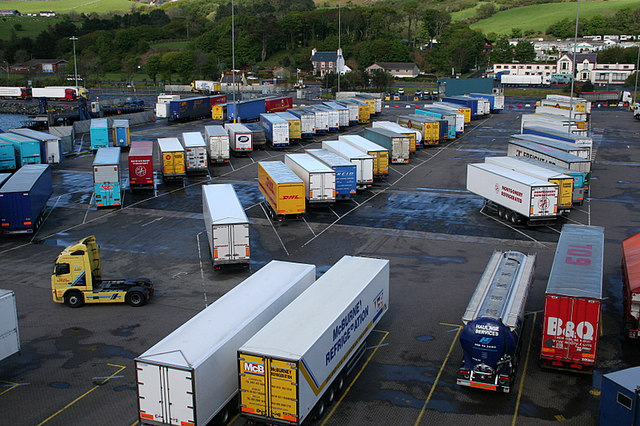Green ports?
By Pat Rafferty, UNITE Scotland (with notes from recent meeting with TJSC from Arthur West)

Freeports have been announced by the UK Government and are a special kind of port or zone where normal tax and customs rules do not apply. These can be maritime ports, airports, the Channel Tunnel or potentially any area in the UK where imports are handled. Eight have been earmarked in England and three each in Wales and Scotland.
Supporters argue that that Freeports can result from direct government support in the form of tax breaks and thereafter stimulate economic activity in areas historically starved of investment. This can be done through tariffs and customs checks being avoided entirely if the product is exported again without ever entering the UK outside the Freeport. In England, companies inside these sites will be offered temporary tax breaks. This includes reductions to the tax companies pay on their existing property, and when they buy new buildings. In May 2021, the UK Government also confirmed that Freeport employers will be able to pay less National Insurance for all new workers, from April 2022.
Unite has deep concerns that the UK Government may allow companies to avoid other regulations – such as worker’s rights – in the name of ‘flexibility’. This could mean companies within a Freeport could attempt to weaken workplace protections including Health and Safety regulations which would represent a substantial risk to the rights and terms and conditions of Unite members. What’s more, the Freeport sites could act as an under cutter for the wider region or industry. There is evidence that Freeports and free zones result in the relocation of existing work from other areas with the promise of tax breaks. Therefore, regional ‘levelling up’ is unlikely to be achieved through corporate tax cuts and deregulation. In fact, the results show us that it results in ‘levelling down’.
Proposals are being brought forward by the Scottish Government to establish what they are calling green ports. The Scottish model adapts the UK Government’s Freeport model but they are stipulating additional priorities to it. Similar to Freeports, green port operators and businesses will be able to benefit from a package of tax and customs incentives. Green port operators will however have to adopt Fair Work First criteria which includes ensuring that all employees are paid the real Living Wage, and that they be fully committed to achieving net zero emissions.
Yet, like the Fair Work principles themselves, it remains unclear if these proposals will be legally binding in ‘green ports’. What we know from the existing evidence in the Scottish economy is that commitments do not go far enough. As of 31st January 2020, 722 businesses had signed up to the Scottish Business Pledge in total, representing just 0.4% of Scotland’s registered business base. Clearly employers are not signing up to the values of fairness, equality and sustainable employment required under the Business Pledge principles in the wider economy so why should we expect anything different in ‘green ports’.
If these proposals get the green light in Scotland, then we need cast iron commitments on workers’ rights including the ability for trade unions to access sites and to organise. Crucially, trade union reps should be given access in order to assess the safety standards within any new ‘green port’. Direct employment must be supported wherever possible and zero hours contracts banned. The Scottish Government has the powers to enforce this because the reality is that without legal enforcement there is nothing to compel employers to enact any criteria.
Like anything you just need to see who is behind this model in order to understand its true purpose. The freeport concept is much admired by the Tory right, which makes it all the more bizarre that the Scottish Government should be consulting on how to adopt this model despite their endeavours to present it as a friendlier version to workers and the environment. Unite will be scrutinising the development of these proposals at every stage of the process to ensure that the Scottish Government doesn’t open the port gates to Trojan Horses determined to attack workers’ rights.
(Photo: Des Colhoun https://commons.wikimedia.org/w/index.php?curid=12949723)
Note from Arthur West, member of the Trade Justice Scotland Coalition:
The issue of Free Ports / Green Ports has been discussed at a number of Trade Justice Coalition Scotland meetings. The above blog post is by Unite’s Scottish Secretary and outlines some of the union’s concerns around Free Port / Green Port developments.
I thought it would be useful to provide the note below of a meeting which took place between Unite representatives and Trade Justice Scotland Coalition representatives in May.
Since that meeting Unite have supplied the coalition with an information leaflet which can be used at stalls organised by local groups who are part of the Coalition.
Unite and the Trade Justice Scotland Coalition will continue to monitor developments re Free Poets / Green Ports and react to developments as appropriate.
Note on Free Ports / Green Ports meeting with Unite representatives
on Wednesday May 26th 2021
- Unite representatives outlined a number of concerns they had about Free Ports / Green Ports. These concerns mainly related to protecting employment rights and concerns over jobs being lost in areas which do not get Free Port / Green Port status.
2. It was noted that there was a prospectus for expressing interest in Green Ports on the Scottish Government website.
3. It was noted that resolution had been passed at recent STUC Congress supporting the need for environmental and employment protections in relation to Free Ports / Green Ports .
4. Noted that although the Scottish Government’s Fair Work framework was useful in highlighting employment rights -the Unite view is that the framework is not legally enforceable.
5. Discussion took place on the most effective ways of campaigning in relation to Free Ports / Green Ports.
6. Discussion took place about the production of leaflets and other materials which highlighted concerns perhaps using a “ red lines “ type leaflet was discussed.
7. Unite researchers present at the meeting agreed to look at leaflets which could be used in trade union and community networks.
8. It was highlighted that local council powers such as responsibility for planning could be used to enforce reasonable standards around Free Ports / Green Ports.
9. We agreed to discuss Free Ports / Green Ports and the points raised at the meeting at the next Trade Justice Coalition meeting.
10. We agreed that following the Trade Justice Coalition meeting – contact would be made with Unite to discuss further activity and to check progress with producing materials for use in Trade Union and Community settings.
 Previous Post
Previous Post Next Post
Next Post